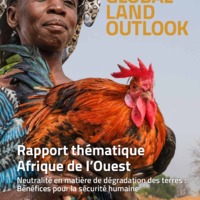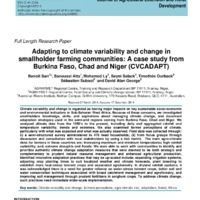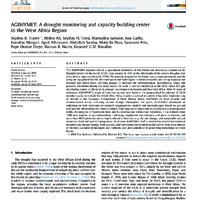Recherche
3 items
Global Land Outlook : Rapport thématique Afrique de l’Ouest. Neutralité en matière de dégradation des terres : Bénéfices pour la sécurité humaine
Le présent rapport thématique du GLO sur l’Afrique de l’Ouest et le Sahel a été élaboré par le Centre régional AGRHYMET dans le cadre d’un Mémorandum d’accord signé en 2019 entre le Comité permanent inter-États de lutte contre la sécheresse dans le Sahel (CILSS) et la Convention des Nations Unies sur la lutte contre la désertification (CNULCD). Ce travail a été accompli avec l’appui généreux de TetraTech, USAID et SERVIR Afrique de l’Ouest. Analysant les enjeux, contraintes et atouts de 7 pays sahéliens (Burkina Faso, Mali, Mauritanie, Niger, Nigéria, Sénégal et Tchad), ce rapport thématique régional met en lumière les acquis et opportunités existants pour favoriser le développement durable et inclusif de toute la région. Ainsi, faisant face à la dégradation des terres, de bonnes pratiques de Gestion Durable des Terres (GDT) ont été développées.
Adapting to climate variability and change in smallholder farming communities: a case study from Burkina faso, Chad and Niger
Climate variability and change is regarded as having major impacts on key sustainable socio-economic and environmental indicators in Sub-Saharan West Africa. Because of these concerns, we investigated smallholders knowledge, skills, and aspirations about managing climate change, and document adaptation strategies used in the semi-arid regions coming from Burkina Faso, Chad and Niger. We analyzed climate data from the 1950’s to the present, including daily and aggregated rainfall and temperature variability, trends and extremes.
AGRHYMET: Adrought monitoring and capacity building center in the West Africa Region
The AGRHYMET Regional Center, a specialized institution of the Permanent Interstates Committee for Drought Control in the Sahel (CILSS), was created in 1974 at the aftermaths of the severe droughts that affected this region in the early 1970s. The mission assigned to the Center was to train personnel, provide adequate equipment for the meteorological and hydrological stations networks, and set up regional and national multidisciplinary working groups to monitor the meteorological, hydrological, crops and pastures conditions during the rainy season. As such, it can be considered as the West Africa drought monitoring center, similarly to its younger counterparts in Eastern and Southern Africa. After 40 years of existence, AGRHYMET’s scope of activities expend now beyond the geographical boundaries of CILSS member states, to include the whole West Africa thanks to several initiatives it has been implementing on behalf of the Economic Commission of West African States (ECOWAS) on food security and environmental issues, including climate change. Throughout the years, AGRHYMET developed, in collaboration with international research organizations, models and methodologies based on ground and satellite observations to monitor rainfall, food crop water requirements satisfaction and prospective yields, the progress of vegetation front and its seasonal and interannual variations. It has trained about 1200 new experts in agrometeorology, hydrology, equipment maintenance, and plant protection, and more than 6000 professionals on topics related to food security, climate change, and sustainable natural resources (land and water) management. As of now, AGRHYMET staff is involved in several international initiatives on climate change, food security, and environmental monitoring that allow them keep abreast of the best available technologies and methods, and also contribute to generating knowledge on those issues.


